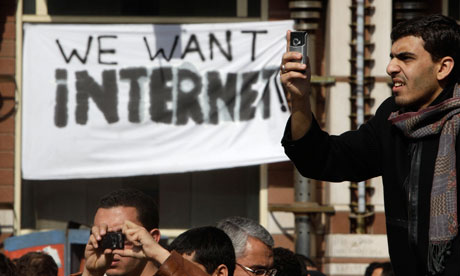Hacking the Middle East
Simplistic pronouncements about the role of social media in stirring uprisings and toppling dictators have by now, thankfully, seemed to die down. That Facebook, Twitter, YouTube and other digital tools have been important to the historic upheaval in the Middle East is an unimpeachable fact. And a closer look at how those tools played a part is more than just interesting — it may offer clues to major social and political movements of the future.
A gathering last week in San Francisco organized by Hacks/Hackers and HackDemocracy showcased some illuminating work on the subject. Stanford computer scientist Rio Akasaka shared an animation he made showing worldwide Twitter activity from Feb. 7 to 14 that used the hashtag #Egypt. Unsurprisingly, the United States and Europe figure most prominently in the dynamic constellation, but there was also a climactic surge across the Middle East, South Asia and South America as news spread on Feb. 11 that Hosni Mubarak no longer held power:
Each dot on the map, Akasaka said, represents a single tweet; at the peak of activity for #Egypt, he said, there were as many as 6,000 per minute.
After the Mubarak regime all but shut down the Internet in Egypt at the end of January, activists moved to work around the technological assault. Egyptians relied even more on mobile phones to connect to the outer world, said Ahmed Shihab-Eldin of Al Jazeera English, in some cases texting and emailing trusted contacts elsewhere in the Middle East or Europe who would disseminate the info via Facebook, Twitter and blogs. Meanwhile, Google and Twitter joined forces to launch speak2tweet, a service that helped Egyptian citizens keep information flowing online by way of voicemails.
Egyptian-born technology entrepreneur Amir Khella said that the R.N.N news hub on Facebook, which reportedly saw a veritable explosion of page views in late January, was the best “hack” he’d seen among any related to the revolution. The R.N.N page pulled together information via text messages, phone calls and emails from people witnessing various events on the ground. R.N.N would crosscheck multiple reports from the same approximate time and location, Khella said, in order to separate fact from rumor. (Who exactly is behind R.N.N remains unclear, he later told me.) It was a nimble kind of crowdsourcing born of the crisis.
No doubt there have been other useful applications of digital technology during this period of seismic change in the Middle East, and surely more will spring up in the months ahead. It’s also important not to overstate their role, and to examine how the Internet has been used nefariously by oppressive regimes.
Maybe in part it’s because the earlier proliferation of Facebook and Twitter in American culture was marked by some frivolity that writers such as Malcolm Gladwell haughtily dismissed them as a sideshow in the context of revolutions. (See Matthew Ingram for a sharp take on how Gladwell went astray.) But as the speakers last week in San Francisco reiterated, a great number of people in the Arab world are using them, and not primarily to muse about what they ate for lunch. Under pressure from the U.S. government, executives at Facebook and Twitter have made moves to keep their platforms viable for activists, and it’s doubtful that their motivations to do so were solely capitalistic.
“We realize that in order to be meaningful, online freedoms must carry over into real-world activism,” said Secretary of State Hillary Clinton in February, in a wide-ranging speech about Internet freedom. She later continued: “The dramatic increase in internet users during the past 10 years has been remarkable to witness. But that was just the opening act. In the next 20 years, nearly 5 billion people will join the network. It is those users who will decide the future.”

Leave a comment